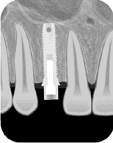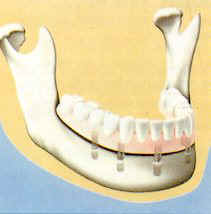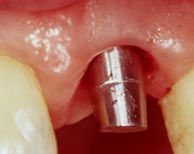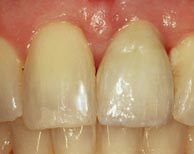
|
|
CONSUMER REPORTS ARTICLE About 19 million American adults have no teeth; another 113 million are missing at least one tooth. Many of those gaps are filled with dentures and bridges. But if you wear such an appliance, you're probably familiar with the limitations - they can weaken your bite, cause discomfort, and even harm the adjacent teeth. Many people are turning to dental implants - artificial teeth surgically anchored into the jawbone and intended to be a better-looking replacement. Ads promote implants as "the next best thing to natural teeth." Perhaps 400,000 individual implants are now done each year. But they're a major investment and not risk-free. If you need extensive work, you could wind up paying tens of thousands of dollars, spending lots of time in dentists' chairs, and waiting more than a year for your new "teeth." You'll also need to be an unusually assertive patient, checking out the credentials of the dentists and the implants they use. Some dentists who do implants have insufficient training, and some implant materials have been in-sufficiently studied. Are implants worth all this? Their track record suggests they are, for some people - but because of their cost and possible complications, you should try other approaches first. Older, cheaper choices Standard dentures and bridges have a lot going for them. You can get them fitted in a matter of weeks, the bill won't exceed a few thousand dollars, and dental insurance usually will pay part of the cost. But they do have their drawbacks. Removable dentures can be hard to eat with because they provide only a fraction of the chewing force of natural teeth. A full lower denture can be especially troublesome; jaw and tongue movements may easily dislodge it. Ill-fitting dentures can be bulky and painful - hard plastic riding atop a thin layer of gum tissue over bone. Partial dentures, which replace a few missing teeth, can also promote tooth decay around their clasps and, by mechanical action, weaken the adjacent teeth. For people missing just one or a few teeth, a fixed bridge looks and feels more like the real thing and provides near-normal chewing force. It's cemented in place over the natural teeth abutting the gap. But those end teeth first must be ground to stubs, to accommodate caps. Bridges can also weaken other teeth: a fixed bridge that spans too wide a gap can loosen the teeth it's cemented to. How implants compare Implants generally look and feel more natural than removable bridges; they provide about the same amount of biting force as fixed bridges but are kinder to neighboring teeth. Although other mechanisms have been used, the implants now typically rely on titanium fixtures inserted into the jawbone during surgery. The process of drilling holes, inserting fixtures, and attaching teeth can be daunting. For a full set of teeth, four to six fixtures are needed in the lower jaw, and six to eight in the upper, where bone is less dense. Patients wear temporary bridges while the bone heals, which takes three months for the lower jaw and six for the upper. Then it can take three or more months to take impressions, fashion individual teeth or multi-tooth segments, and attach them to the fixtures. The replacement teeth can take some time to get just right; the bite needs to be well adjusted to distribute pressure evenly. Each fixture can cost $800 to $2500; each crown, $600 to $1500. While the total cost for a single-tooth implant - $1500 to $4000 - isn't much more than that for a small fixed bridge, costs quickly rise from there. A full upper or lower jaw can cost as much as $18,000 to $30,000 - 10 to 15 times as much as a full denture. For people who need complete dentures, a slightly less expensive option (around $10,000) is a removable "overdenture" that attaches to two or four posts. How permanent are these new teeth? No one knows for sure, since the earliest implants are just 30 years old. Most failures appear to occur early on, if a fixture fails to integrate with the bone, or if it comes loose. An implant's reliability seems to be influenced by its location; the survival rate after five years is about 95 percent for implants in the front of the lower jaw but about 85 percent for implants in the sides and rear of the upper jaw. In a very few patients, implants fail completely. Dentists usually can replace loose fixtures by letting bone refill the socket and drilling again in a few months. One reason implants fail is poor oral hygiene. You'll need to floss and brush assiduously, into the openings and around fixtures, using special brushes. You'll also need to be seen by your dentist as often as four times a year. The operation Being fitted with implants is not a minor procedure. Here are two key factors to consider: Are you a good candidate? Certain drugs and diseases that compromise healing - steroids or uncontrolled diabetes, for instance - can lessen your chances of a good result. Smokers and heavy drinkers may not get good results, either. Moreover, you must have enough bone for the fixtures to hold. Otherwise, you may be headed down an expensive detour: thousands of dollars (and an extra nine months) for bone grafts. Finally, since your gums won't cling to artificial teeth as tightly as to normal teeth, some dentists recommend additional surgery to make your gum line look more natural. Which dentists? Some dentists operate after taking only a weekend course. Avoid them. It's best to be treated by an experienced pair of specialists, one to operate and the other (a prosthodontist or general dentist) to craft your new teeth. Look for a team that has done at least 50 cases overall and 10 to 15 like yours. Ask to speak with some other patients. The surgery should be done by an oral surgeon, periodontist, or prosthodontist - or a general dentist with extra credentials such as those issued by the American Academy of Implant Dentistry (for a list, call the Academy at 312 335-1550). Ask any potential surgeon whether the hardware he or she uses has been accepted by the American Dental Association. To gain ADA acceptance, manufacturers must conduct two five-year clinical studies to show the hardware holds up in real use. Most implant systems don't have ADA acceptance. Recommendations Implants might make sense if you have dentures and can't adjust to them, or if you want to fill gaps without harming adjacent teeth - and if you have the money. Still, it is not a decision to make lightly. Weigh not only your wallet but also your willingness to seek out a reliable practitioner, to put up with months of procedures and temporary teeth, to be scrupulous about hygiene, and to accept the small chance that the effort may fail and you'll end up with dentures anyway.
Get on your Dentist's prescribe and order an Occlusal Guard now!
|





